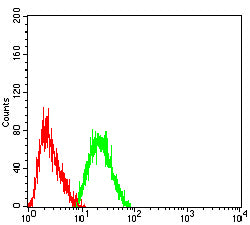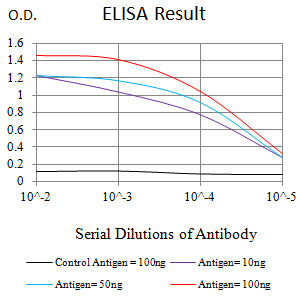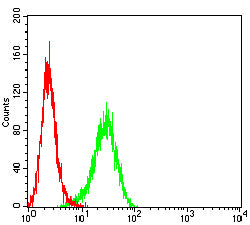


| WB | 咨询技术 | Human,Mouse,Rat |
| IF | 咨询技术 | Human,Mouse,Rat |
| IHC | 咨询技术 | Human,Mouse,Rat |
| ICC | 技术咨询 | Human,Mouse,Rat |
| FCM | 1/200-1/400 | Human,Mouse,Rat |
| Elisa | 1/10000 | Human,Mouse,Rat |
| Aliases | CLEC4C; DLEC; HECL; BDCA2; BDCA-2; CLECSF7; CLECSF11; PRO34150 |
| Entrez GeneID | 170482 |
| clone | 3F9B1 |
| WB Predicted band size | 25kDa |
| Host/Isotype | Mouse IgG1 |
| Antibody Type | Primary antibody |
| Storage | Store at 4°C short term. Aliquot and store at -20°C long term. Avoid freeze/thaw cycles. |
| Species Reactivity | Human |
| Immunogen | Purified recombinant fragment of human CD303 (AA: extra 45-213) expressed in E. Coli. |
| Formulation | Purified antibody in PBS with 0.05% sodium azide |
+ +
以下是关于CD303抗体的3篇参考文献及其摘要概括:
---
1. **标题**: "BDCA-2. a Novel Plasmacytoid Dendritic Cell-Specific Type II C-Type Lectin, Mediates Antigen Capture and Is a Potent Inhibitor of Interferon α/β Induction"
**作者**: Dzionek, A. et al.
**摘要**: 该研究首次鉴定了BDCA-2(CD303)作为浆细胞样树突状细胞(pDC)的特异性表面标志物,发现其通过内吞作用介导抗原摄取,并能抑制干扰素-α/β的产生,提示其在调节pDC免疫应答中的关键作用。
---
2. **标题**: "CD303 (BDCA-2) Signals in Plasmacytoid Dendritic Cells via a Dual Receptor Complex Targeting TLR9 and FcεRIγ"
**作者**: Cao, W. et al.
**摘要**: 本文揭示了CD303抗体结合后通过TLR9和FcεRIγ双受体复合物激活下游信号通路,阐明了其在pDC功能调控中的分子机制,并探讨了其在自身免疫性疾病(如红斑狼疮)中的潜在治疗价值。
---
3. **标题**: "BDCA-2 (CD303): A Marker of Plasmacytoid Dendritic Cells in Diagnostic Applications and Its Role in Viral Sensing Inhibition"
**作者**: Swiecki, M. & Colonna, M.
**摘要**: 研究评估了CD303抗体在诊断中作为pDC特异性标记的实用性,同时发现其通过抑制病毒核酸识别降低pDC的I型干扰素分泌,为靶向CD303治疗病毒感染相关炎症提供了理论依据。
---
**备注**:以上文献发表于《Blood》《Journal of Experimental Medicine》等期刊,涵盖CD303的结构功能、信号机制及临床应用方向。如需具体年份或补充文献,可进一步检索PubMed或Web of Science。
CD303. also known as BDCA-2 (Blood Dendritic Cell Antigen 2), is a C-type lectin receptor predominantly expressed on the surface of plasmacytoid dendritic cells (pDCs), a specialized subset of dendritic cells involved in antiviral immunity and immune tolerance. Discovered in the early 2000s, CD303 is a type II transmembrane glycoprotein that forms homodimers and recognizes carbohydrate motifs via its extracellular lectin domain. It plays a role in antigen recognition, endocytosis, and immune regulation by modulating pDC activation. Engagement of CD303 inhibits type I interferon (IFN-α/β) production, a key feature of pDCs, suggesting its role in dampening excessive immune responses.
CD303 antibodies, such as the monoclonal antibody AC144. are widely used as specific markers to identify and isolate pDCs in research and diagnostics. These antibodies are valuable in studying pDC biology, including their involvement in autoimmune diseases (e.g., lupus), viral infections, and cancers. In pathology, CD303 immunohistochemistry aids in diagnosing blastic plasmacytoid dendritic cell neoplasm (BPDCN), a rare malignancy derived from pDCs. Therapeutic applications are under exploration, including anti-CD303-targeted therapies for autoimmune disorders or cancers. However, its ligand specificity and signaling mechanisms remain partially understood, prompting ongoing research to elucidate its broader immunological roles.
×